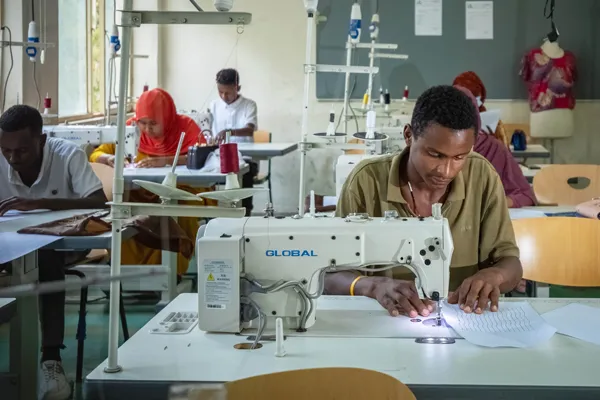Hope restored: From street child to student in Ethiopia

Photo: Petterik Wiggers.
Fedile, 19, no longer needs to face the dangers of living on the street and is happy that he can finally pursue an education. Despite his young age, he has experienced a lot of hardship.
He lives in Dire Dawa, a city in eastern Ethiopia, but grew up in Jimma, in the southwest. When his parents divorced, he was forced to stay with his father and work on his coffee farm. Their relationship was marked by many conflicts.
“After my parents separated, the situation at home became difficult. My father shouted at me a lot,” Fedile says. “When I met a friend who was experiencing the same difficulties with his family, we decided to run away. I have lived in Dire Dawa for five years now.”
At 14, Fedile took on different jobs to get by. He started saving money because he wanted to go back home.
“At one point, I was doing quite well. I was working at a hotel; I had a phone and savings,” he says. “I was about to return home. I had my luggage with me, but then I got robbed and lost everything. That’s when I ended up living on the streets of Dire Dawa.”
SOS Children’s Villages transition centres
In response to the alarming number of street children, SOS Children’s Villages Ethiopia has implemented projects to get children and young people off the streets and support them in their transition.
The initiatives consist of different activities, ranging from outreach services to children and young people on the street or at risk of being forced onto the street to health services, food distribution, shelter and finding family members. Family reintegration is supported if it is in the children's and young people's best interest. Young people can also receive technical and vocational skills training to support them on their path to formal employment and independent living.
“When we first reached out to Fedile, he, like many other street children, refused to come to the transition centre for temporary shelter. He thought it was a joke,” says Micheal Sintayehu, project coordinator of SOS Children’s Villages in Dire Dawa. “These children face very harsh realities and are regularly confronted with abuse, discrimination, and harassment. No child or young person chooses to live on the street.”
“Through the food and mobile health services and the provision of counselling, we are able to build trust. At our transition centres, we offer children and young people temporary shelter to protect them from harm and provide them with opportunities to regain a sense of normalcy in their lives,” says Michael.
Through an initiative with one of the local universities in Dire Dawa, SOS Children’s Villages Street Children Project participants can take courses on earning and saving money and building a business or more practical courses to develop skills for formal employment.
“Fedile decided to come to the transition centre and enrolled in a course at the technical and vocational skills training centre. He became one of our best students and was offered a job after finalizing the training,” says Micheal proudly.
“At the training centre, I am learning how to make garments. I really enjoy that work,” says Fedile happily. “My life has changed so much because of this program. I have three meals a day; I am attending training and will have a job after finishing it. Now, I feel like I can make progress in my life.”
SOS Children’s Villages is committed to making a positive, lasting impact on the lives of vulnerable children like Fedile. We are dedicated to creating a future where every child has the opportunity to flourish, no matter their circumstances.
According to UNICEF, an estimated 120 million children live on the streets worldwide. The extent of the problem varies from region to region, with Ethiopia being one of the countries with the highest number of children forced onto the streets due to factors such as poverty, loss of parental care, conflicts and climate change-induced droughts and famines. The Ethiopian government states that there are over 150,000 street children in the country. However, UNICEF says the problem is far more serious, with nearly 600,000 street children nationwide.
